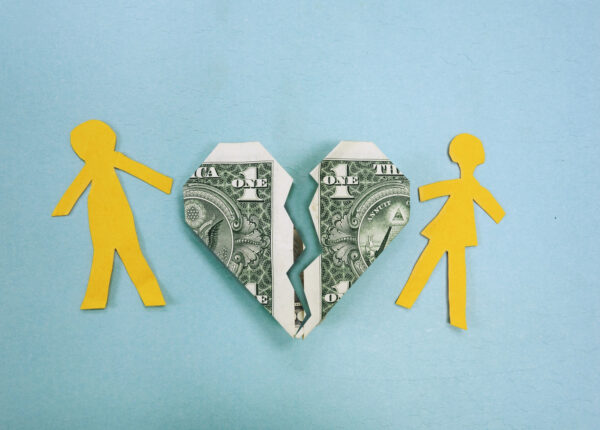The short answer: "It depends."
Debt can take over every aspect of your life. So can the end of your marriage. Dealing with divorce and bankruptcy together is an incredibly difficult process, and it's natural to feel lost, confused, and overwhelmed.
The first thing to understand is that you are not alone. Financial issues are one of the most common reasons couples divorce, and conversely, divorce is one of the most common reasons people file for bankruptcy. There are many hardworking people who have been through the same situation, and while it's difficult, it is not insurmountable.

The second thing to understand is that you have options. Depending on the situation, it may make more sense to file for bankruptcy before or after you file for divorce. What you really don't want to do is file for both at the same time — the legal proceedings will slow each other down, so it's almost always best to file for one or the other first.
Here are a few pros and cons of each option. Remember, this is general information, not legal advice. If you're facing this situation, talk to an experienced attorney as soon as possible for specific advice on your individual circumstances.
Reasons to file for bankruptcy before divorce
- You may qualify for higher exemptions on your property. As long as you are still legally married, you can take advantage of the bankruptcy exemptions for married couples. This can potentially allow you to protect more of your property than if you filed for bankruptcy as an individual.
- The division of property and debt in the divorce may be simpler. If you can get some or all of your debts discharged before your divorce, that's one less thing that has to be accounted for in the divorce itself — and one less source of potential conflict with your soon-to-be former spouse.
- You can reduce costs and simplify the process by filing jointly. If both you and your spouse need to file bankruptcy anyway, filing one joint bankruptcy will be faster and cost less than filing two separate bankruptcies.
Reasons to file for bankruptcy after divorce
- You need to file Chapter 13 instead of Chapter 7. While Chapter 7 bankruptcy is a relatively quick process that discharges your debts within four to six months, Chapter 13 locks you into a repayment plan for three to five years. If you file jointly for Chapter 13, that means you will spend several years in a joint repayment plan as you're trying to build separate lives. It's often better to wait and file separately.
- Your divorce is not amicable. If you and your spouse have a great deal of conflict, it may be better to get the divorce over with first so that you can deal with your bankruptcy on your own, without having to depend on them working with you.
Consider how your divorce could affect the Chapter 7 means test
The means test deserves special mention because it can go either way depending on your financial circumstances.
If you can't pass the means test to file for bankruptcy jointly, you may have to wait until after your divorce to file separately. In some circumstances, it's possible for both spouses to qualify for Chapter 7 after the divorce even though neither would have qualified before the divorce.
On the other hand, if you are the sole income earner with a stay-at-home spouse, it's entirely possible that you can qualify to file Chapter 7 jointly before the divorce, but your individual income would be too high to be eligible for Chapter 7 after the divorce.
Talk to an experienced attorney about the interaction between bankruptcy and divorce
One final point to keep in mind: since your creditors are not parties to your divorce, they are not bound by what the family court decides in terms of property and debt division. In particular, if your spouse gets a joint debt discharged in bankruptcy and you don't, then your creditors are free to hold you responsible for the debt, even if the family court had ordered your spouse to pay it. That's yet another reason you should talk to an attorney about the implications of your divorce and bankruptcy.
If you're considering both bankruptcy and divorce, it's essential that you get experienced legal advice on all aspects of your situation. Although we do not represent clients in family court, we are familiar with how bankruptcy interacts with divorce and family court issues, and we work closely with divorce and family law attorneys to make sure our clients' interests are protected in all aspects of their cases. Give us a call or contact us online for a free, confidential consultation.
